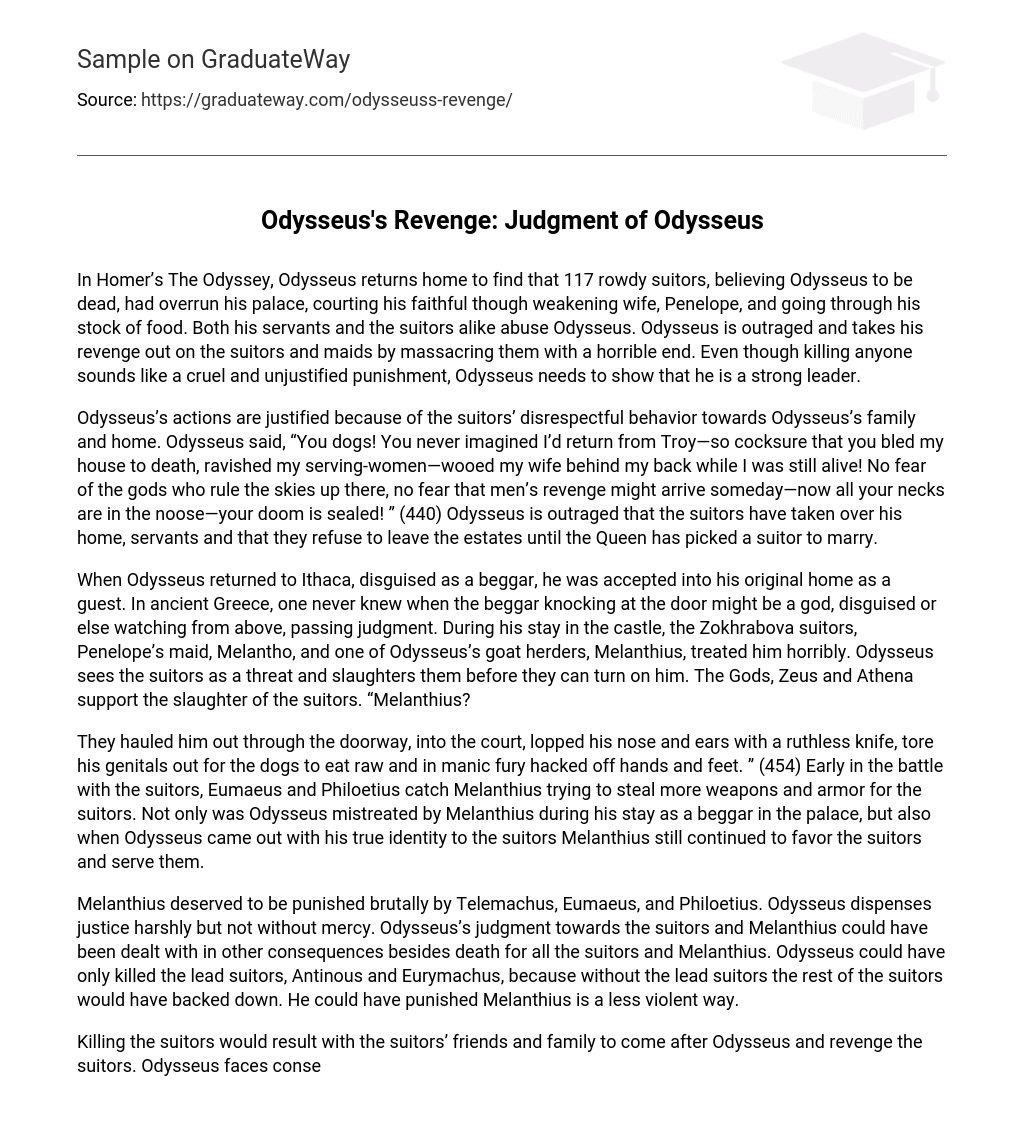In Homer’s The Odyssey, Odysseus returns home to find that 117 rowdy suitors, believing Odysseus to be dead, had overrun his palace, courting his faithful though weakening wife, Penelope, and going through his stock of food. Both his servants and the suitors alike abuse Odysseus. Odysseus is outraged and takes his revenge out on the suitors and maids by massacring them with a horrible end. Even though killing anyone sounds like a cruel and unjustified punishment, Odysseus needs to show that he is a strong leader.
Odysseus’s actions are justified because of the suitors’ disrespectful behavior towards Odysseus’s family and home. Odysseus said, “You dogs! You never imagined I’d return from Troy—so cocksure that you bled my house to death, ravished my serving-women—wooed my wife behind my back while I was still alive! No fear of the gods who rule the skies up there, no fear that men’s revenge might arrive someday—now all your necks are in the noose—your doom is sealed! ” (440) Odysseus is outraged that the suitors have taken over his home, servants and that they refuse to leave the estates until the Queen has picked a suitor to marry.
When Odysseus returned to Ithaca, disguised as a beggar, he was accepted into his original home as a guest. In ancient Greece, one never knew when the beggar knocking at the door might be a god, disguised or else watching from above, passing judgment. During his stay in the castle, the Zokhrabova suitors, Penelope’s maid, Melantho, and one of Odysseus’s goat herders, Melanthius, treated him horribly. Odysseus sees the suitors as a threat and slaughters them before they can turn on him. The Gods, Zeus and Athena support the slaughter of the suitors. “Melanthius?
They hauled him out through the doorway, into the court, lopped his nose and ears with a ruthless knife, tore his genitals out for the dogs to eat raw and in manic fury hacked off hands and feet. ” (454) Early in the battle with the suitors, Eumaeus and Philoetius catch Melanthius trying to steal more weapons and armor for the suitors. Not only was Odysseus mistreated by Melanthius during his stay as a beggar in the palace, but also when Odysseus came out with his true identity to the suitors Melanthius still continued to favor the suitors and serve them.
Melanthius deserved to be punished brutally by Telemachus, Eumaeus, and Philoetius. Odysseus dispenses justice harshly but not without mercy. Odysseus’s judgment towards the suitors and Melanthius could have been dealt with in other consequences besides death for all the suitors and Melanthius. Odysseus could have only killed the lead suitors, Antinous and Eurymachus, because without the lead suitors the rest of the suitors would have backed down. He could have punished Melanthius is a less violent way.
Killing the suitors would result with the suitors’ friends and family to come after Odysseus and revenge the suitors. Odysseus faces consequences and a risk of being killed himself. “And there Odysseus lay …plotting within himself the suitors’ death—awake, alert, as the women slipped from the house, the maids who whored in the suitors’ beds each night, tittering, linking arms and frisking as before. The master’s anger rose inside his chest, torn in thought, debating, head and heart—should he up and rush them, kill them one and allor let them rut with their lovers one last time? ”
Odysseus believes that the maids are as bad as the suitors, if not worse. From what Odysseus has seen, from his point of view as a beggar, the maids have a moral attitude similar to the suitors. Melantho, one of Penelope’s maids, verbally abuses Odysseus and has no respect for the Ancient Greek “Guest Law” custom. Odysseus feels betrayed by his own servants since many of the maids seem to have a type of relationship with the suitors. Telemachus takes the maids out of the great hall after they were forced to clean up the suitors’ remains and they were hanged for a slow, painful death.
Since the maids are Odysseus’s property, he gets to punish them as he pleases. Punishing the maids in this horror sends a message to the other slaves to not go against Odysseus in fear of him punishing them in the same manner. Odysseus shouldn’t have been so harsh on the maids. The suitors could’ve forced the maids to have a relationship with them. Odysseus only knows about one disloyal maid, Melantho, because he has experienced her abuse, what about the other maids? Odysseus put too much faith in Eurycleia when she names 12 disloyal maids.
Eurycleia could not have liked the other maids and wanted to get rid of them. All those maids did not deserve to be punished to that extreme. Melantho was guiltier than others and should have been the only maid to get punished. Odysseus has slaughtered more than 100 young men from powerful families on Ithaca and surrounding islands and his 12 servants. He knows that he has to deal with an attempt at revenge, but his reasons for killing the suitors and his disloyal maids are justified through their actions towards his home and family.





